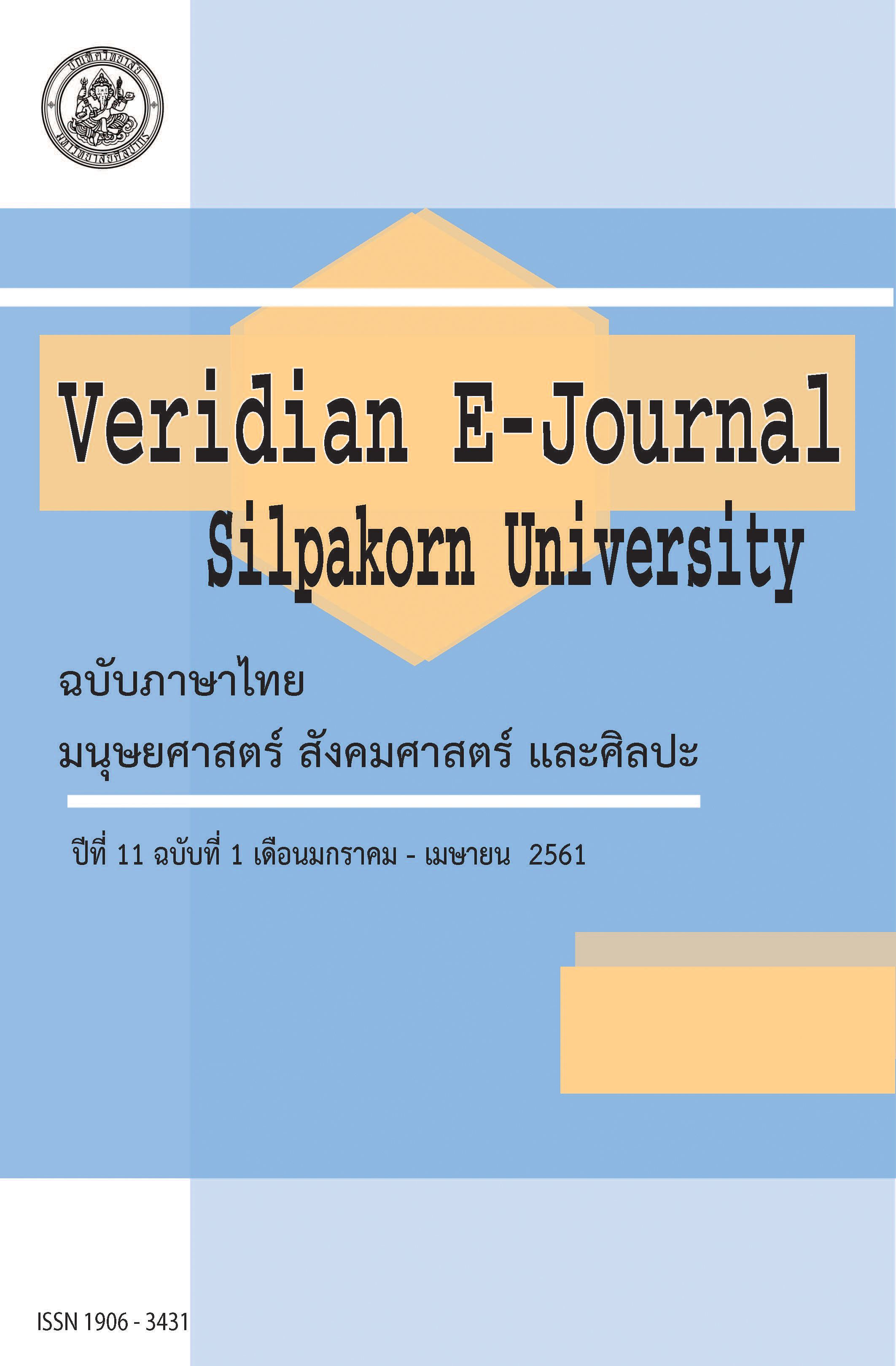การพัฒนาทรัพยากรมนุษย์โดยการปฏิบัติวิปัสสนากรรมฐานตามแนวสติปัฏฐานสี่ (The Four Focuses Insight Meditation Practice for Human Resource Development )
Main Article Content
Abstract
การวิจัยนี้มีวัตถุประสงค์เพื่อ (1) ศึกษาวิเคราะห์หลักธรรมและแนวทางการปฏิบัติวิปัสสนากรรมฐานตามแนวสติปัฏฐานสี่ในส่วนที่เกี่ยวข้องกับคุณภาพชีวิต (2) ประเมินผลการปฏิบัติวิปัสสนากรรมฐานตามแนวสติปัฏฐานสี่ของผู้ที่มาปฏิบัติ ณ ศูนย์ปฏิบัติวิปัสสนากรรมฐานวัดถ้ำพระผาคอก อำเภอเวียงชัย จังหวัดเชียงราย และ (3) เสนอแนวทางการพัฒนาทรัพยากรมนุษย์โดยการปฏิบัติวิปัสสนากรรมฐานตามแนวสติปัฏฐานสี่ กลุ่มตัวอย่างจำนวน 276 คน สุ่มมาจากประชากร 887 คน โดยคำนวณหาจากสูตร Taro Yamane ที่ระดับความเชื่อมั่นร้อยละ 95 โดยแบ่งออกเปตามเป็น 2 กลุ่ม กลุ่มแรกคือผู้ที่เลื่อมใสศรัทธาในพระพุทธศาสนา จำนวน 221 คน และกลุ่มที่สองคือกลุ่มผู้มีปัญหาในการดำรงชีวิตจำนวน 55 คน โดยใช้วิธีการสุ่มตัวอย่างแบบเจาะจง ข้อมูลที่จำเป็นเก็บรวบรวมโดยใช้ แบบสอบถาม การสัมภาษณ์เชิงลึก การสังเกตแบบมีส่วนร่วม และการสนทนากลุ่ม ข้อมูลที่รวบรวมวิเคราะห์โดยใช้สถิติพรรณนาและวิเคราะห์เนื้อหา(Content analysis)
ผลการศึกษา สรุปได้ดังนี้
- หลักธรรมที่เกี่ยวข้องกับคุณภาพชีวิตคือ สติปัฏฐานเป็นหลักธรรมสำคัญในพระพุทธศาสนาที่กล่าวไว้ในมหาสติปัฏฐานสูตร เป็นพระสูตรหนึ่งที่สมเด็จพระสัมมาสัมพุทธเจ้าตรัสสอน และทรงพิจารณาเห็นความสำคัญนี้มาแต่แรกตรัสรู้ เตือนให้มีตนเป็นที่พึ่งแห่งตนเป็นสรณะ การปฏิบัติวิปัสสนาตามหลักสติปัฏฐานต้องใช้สติสัมปชัญญะเข้าไปกำหนดกาย เวทนา จิต และธรรม ผู้ที่ปรารถนาจะบรรลุมรรคผลคือ นิพพาน ต้องเริ่มต้นด้วยสติปัฏฐาน เมื่อศึกษาถึงลักษณะการเกี่ยวข้องกับคุณภาพชีวิต ได้ 3 ลักษณะคือ 1) หลักธรรมที่เป็นเหตุก่อให้เกิดความสำเร็จในการปฏิบัติวิปัสสนากรรมฐาน 2) หลักธรรมที่เกิดขึ้นในขณะอยู่ในกระบวนการปฏิบัติ และ 3) คือหลักธรรมที่เกี่ยวข้องที่ส่งผลหลังการปฏิบัติ
- ผลการปฏิบัติวิปัสสนากรรมฐานตามแนวสติปัฏฐานสี่ของผู้ที่มาปฏิบัติ ณ ศูนย์ปฏิบัติวิปัสสนากรรมฐานวัดถ้ำพระผาคอก อำเภอเวียงชัย จังหวัดเชียงราย หลังการปฏิบัติพบว่าทั้งสองกลุ่มมีความเปลี่ยนแปลงไปในทางที่ดีขึ้น สุขภาพกายสุขภาพจิตดีขึ้น มีความสุขความพอใจในชีวิตตนเอง เข้าใจเพื่อนมนุษย์ มีสติปัญญาแก้ปัญหาในชีวิตได้ดีขึ้น เข้าใจยอมรับความจริงความเปลี่ยนแปลงที่เกิดขึ้นได้ นอกจากนั้นยังพบแนวทางไปใช้ได้โดยเป็นแนวปฏิบัติเพื่อให้มีสติสัมปชัญญะให้รู้ทันในปัจจุบันในสิ่งที่เกิดหรือปรากฏในฐานทั้ง 4 คือ กาย เวทนา จิต และธรรม ซึ่งต้องรู้และเข้าใจถึงลักษณะหรือคุณสมบัติสืบสาวไปถึงเหตุและปัจจัยที่ทำให้เกิดหรือปรากฏขึ้น รู้และเข้าใจถึงกระบวนการเกิด รู้และเข้าใจถึงเหตุและปัจจัยการดับตลอดจนทำการดับ
- แนวปฏิบัตินี้ทำให้เกิดสมาธิและปัญญา สามารถนำไปใช้ในการทำงาน เป็นหลักสูตรในการจัดการศึกษา และนำไปใช้ในการดำเนินชีวิตให้มีความสุขเกิดการพัฒนาคุณภาพชีวิตอย่างยั่งยืน
The objectives of this study were (1) To study about the Four Focuses Insight Meditation Practice and quality of life. (2) To analyze and evaluate the Four Focuses Insight Meditation Practice at Thamprapakhok meditation center, Wiangchai district, Chiangrai province. (3) To present guidelines for human resource development by the Four Focuses Insight Meditation Practice. The 276 samples from 887 populations calculated by Taro Yamane at 95% Confidence Interval and specific sampling were divided into 2 groups; the first 221 people who believe in Buddhism and the other 55 people who have been with common living problems. The research instruments were questionnaire, in-depth interview, participant observation, and focus group discussion. The collected data were analyzed by descriptive statistic and content analysis.
The conclusions of the research were;
- The dharmic principal relates to quality of life. The Lord Buddha had discovered the importance of the Four Focuses Insight Meditation Practice since the day of enlightenment. To warn ourselves who dwell with ourselves as our own island, people use consciousness to control body, feelings, mind and mind-objects. The people who wish to attain the Path and Fruit of Nibhana must begin with Four Focuses Insight Meditation. There are 3 features of Buddhism principle relating to quality of life as followed: 1) Buddhism principle relating to the cause of meditation practice achievement. 2) Buddhism principle relating to the effect in the process; and 3) Buddhism principle relating to the effect after practicing.
- The result of the Four Focuses Insight Meditation Practice of the people who practiced at Thamprapakhok meditation center, Wiangchai district, Chiangrai province. researchers found that both 2 groups had the better changes that are having the better mental health, satisfaction in themselves, understanding others, having ability to solve their common living problems and agreeing to the truth and the changing. Moreover, we also found the guideline for having the consciousness of things happening in body, feelings, mind and mind-objects. People must know and understand the features or qualifications connecting to the causes or factors that make it happen or appear. Knowing and understanding the process and cause of the end of suffering.
- This Mediation Practice creates meditation and wisdom. People can apply to the process of working, creating educational curriculum and living with happiness and sustainable development.
